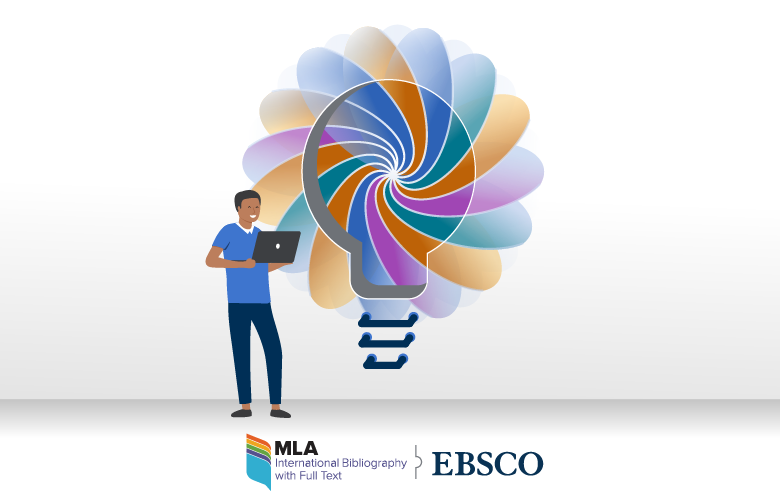In partnership with Choice and the Association of College and Research Libraries (ACRL), the Modern Language Association (MLA) and EBSCO cosponsored a webinar on May 20th titled Technology and Evolving Research Practices in the Humanities to discuss how emerging technologies and AI tools are influencing the academic landscape.
Elizabeth Brookbank, Instruction Librarian and Professor at Western Oregon University; Ellen C. Carillo, Professor of English and Writing Coordinator at the University of Connecticut; and Leo Flores, Chair of the English Department at Appalachian State University, served as panelists in a discussion moderated by Angela Gibson, Senior Director of Operational Strategy at the MLA. This three-part webinar defined information literacy and AI literacy, raised thoughtful questions about artificial intelligence, and addressed questions from the audience.
Information Literacy and AI Literacy
The ACRL, in its Framework for Information Literacy for Higher Education, defines information literacy as “the set of integrated abilities encompassing the reflective discovery of information, the understanding of how information is produced and valued, and the use of information in creating new knowledge and participating ethically in communities of learning.” Although the term was coined in the 1970s, the set of skills it describes have become increasingly essential given the proliferation of content online, the rise of misinformation, and the consequent need to remain vigilant when vetting source material. The advent of generative AI and the new tools making their way into the hands of students, faculty members, and librarians makes developing information literacy skills—and expanding them to include AI literacy skills—urgent.
Webinar panelists acknowledged that this urgency, and the challenges and possibilities of generative AI, can be overwhelming for instructors, researchers, and students alike. The panelists stressed the importance of keeping AI’s limitations in mind when helping students learn about it and when evaluating the validity of AI outputs, noting that one’s area of expertise should always be measured against generated responses. They encouraged attendees to think about how AI can be used to enhance existing workflows, explore large datasets in databases and archival collections, and promote the cultivation of information literacy in classrooms and research settings.
Key Questions
In the second section of the webinar, the moderator posed four essential questions to consider when discussing artificial intelligence in the context of academia:
- AI: If, when, and how?
- When and why is human intervention important with generative AI?
- What considerations are key in AI policy development on campus?
- What responsibilities do educators have when it comes to generative AI?
In discussing the first two questions, panelists noted that appropriate use cases for AI may differ, depending on whether a user is a librarian instructor, faculty educator, or student researcher, but acknowledged that because of the evolving technological landscape, it is critical for humanities scholars to consider the “when” and “how” of using AI. Additionally, panelists encouraged webinar attendees to think of themselves as the experts, and their AI tool of choice as the novice, so that AI’s role as an assistant rather than a replacement for human knowledge remains clear.
The last two questions raised by the moderator echoed a concern shared by many audience members: For instructors and librarians, where does the responsibility lie in teaching AI literacy and fluency, especially when institutions lack clear AI policies? Speakers advised that, while policies and guidelines may vary from campus to campus, teaching AI literacy skills to students will prove useful when preparing graduates for the workforce and for positions that require a base-level knowledge of AI. The panelists reasoned that it is better for students and educators to experiment with generative AI and to learn about its capabilities and limitations than it is to ignore the technological transformations occurring within humanities research environments.
"Panelists encouraged webinar attendees to think of themselves as the experts, and their AI tool of choice as the novice, so that AI’s role as an assistant rather than a replacement for human knowledge remains clear."
"Panelists encouraged webinar attendees to think of themselves as the experts, and their AI tool of choice as the novice, so that AI’s role as an assistant rather than a replacement for human knowledge remains clear."
Common Themes from Audience Questions
The last section of the webinar was reserved for addressing attendees’ questions. A common theme that arose in the comments of many audience members related to the ethical implications of using AI. Many librarians, faculty members, and students see the value in AI but wonder where the line is drawn when it comes to the ethical versus unethical use of AI-generated content. The panelists agreed that it is important to assess AI outputs with a critical lens—since AI hallucinations, fabrications, deepfakes, and false attributions do exist—and cautioned against using AI tools as search engines, underscoring the value of scholarly databases like the MLA International Bibliography with Full Text. AI tools like ChatGPT and Gemini can be thought of as brainstorming partners and collaborators that may help kick-start the research process but should not be seen as a replacement for trusted library resources.
Webinar attendees also raised questions related to AI’s impact on learning; many instructors worry that AI will inhibit students’ ability to think critically and engage thoughtfully if they are relying on generative technologies for reading and writing tasks. While it is true that AI is rapidly changing the research landscape, it is also true that students are finding creative ways to advance their thinking, get feedback, and use prompt engineering and chat functions to surface information differently—in other words, they are using AI to become information literate and to foster critical thinking skills.
How to evaluate AI tools and use them for different purposes was another common theme that emerged in attendees’ questions. Webinar panelists encouraged educators to conduct research on generative AI services and familiarize themselves with their nuances in order to better understand which tools are best suited for particular tasks. AI tools are constantly changing and evolving, but they are also becoming integrated into popular operating systems and search engines like Google, so it is crucial, now more than ever, to learn about these technologies and how they function. Writing and tutoring centers, as well as organizations like the MLA, are invaluable knowledge hubs for academic communities in need of AI mentorship and guidance.
Concluding Summary and Links to Learn More
Artificial intelligence services and generative technologies have the potential to help faculty members, library instructors, and students who are looking to reinvent traditional reading, writing, and research practices. The MLA is in the process of creating additional resources that will help those in the humanities better understand how to harness AI tools and use them to their advantage. The MLA also offers several existing resources intended to support the development of information literacy and AI literacy.



